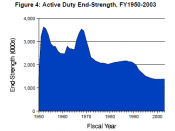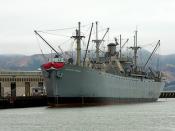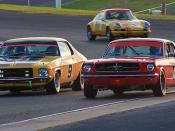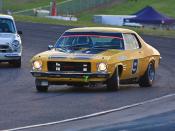Tim O'Brien William Timothy O'Brien was born on October 1st, 1946 in Austin, Minnesota. He planned on having a good career, and to follow in the foot- steps of his parents. His father, William, was an insurance agent, and his mother, Ava, was a school teacher. Tim graduated from high school, and then went on to college to continue his education. At the age of twenty-two, he was drafted into the United States Armed Forces to fight during the conflict in Vietnam. Tim was less than thrilled. Being a soldier in the Army was not something that he saw himself doing. He saw himself being a writer, trying to earn himself a good living. As he wrote in one of his stories in the book The Things They Carried, a week before he was supposed to be shipped out to boot camp, he took his car and drove up North.
He spent about four days there, wondering whether or not he should flee to Canada, which was only about 15 yards away from where he stood. He ended up going back home, because he didn't want to be known as a coward. He didn't want to go to Vietnam. There was a lot of what we would now call "peer pressure". There were many anti-war movements going on, and they also made it very hard on a new soldier. They were wondering if they were making some big mistake. There were those who wanted to fight, and then there were those who didn't care if they went, or not. Then there were those who knew in their hearts that it was the biggest mistake they would ever make. O'Brien served in the Army from the year 1968 through 1970, during which time he earned the rank of sergeant. He also received a Purple Heart, from an injury that was sustained during the time he spent in Vietnam. After he returned home from Vietnam in 1970, he decided to finish off his college education at Harvard University. He went on to become a writer, and also a national affairs reporter for the Washington Post. A few years later, he was a teacher at the Breadloaf Writers Conference, in Ripton, Vermont. Tim O'Brien is very well known for his fictional, yet still very emotional, accounts of the Vietnam war. He bases his writings on his own experiences, and those experiences not only reflect on what he may have felt physically, but also emotionally, and mentally. Many soldiers who returned from the battlefields had emotional problems to accompany their already mixed-up feelings. The following statement was taken from The Progressive, December of 1994: "Besides the well-deserved guilt and shame and anguish evoked by the- war, Americans can take rightful pride in two great national achievements: The anti-war movements, and the other is the great literature that was produced by the war." One of O'Briens' novels, The Things They Carried, was one of his more emotional books. Filled with a collection of short stories, this book "carried" much more than the usual blood-and-gore tales found in books relating to war. He described his feelings as he killed one man: "A young man came out of the morning fog," he read. "I did not hate the young man. I did not see him as the enemy. I did not ponder issues of morality. I haven't finished sorting it out," he added. "Sometimes I forgive myself, other times I don't." (The Things They Carried). The Things They Carried referred to to things that a soldier will remember forever. Maybe they weren't all physical items, but things such as fear, exhaustion, and memories. In Times Literary Supplement, Julian Loose described this book as "a style that combines the sharp, unsentimental rhythms- of Hemingway with gentler, more lyrical descriptions which give the reader a shockingly visceral sense of what it felt like to tramp through a booby-trapped jungle." In the chapter entitled "Notes", O'Brien explained everything in further detail. A main character in all of the stories in The Things They Carried was a man named Paul Berlin. "Paul Berlin" was a fictitious name...used to protect the privacy of a man named Norman Bowker. Norman Bowker was a soldier, a man who had to suffer through many flashbacks and midnight sweats. Norman Bowker was a major influence on Tim O'Brien's writing. He was one of Tim's best friends, and he was suffering through a very hard time. As a teenager, Norman was a very happy, and outgoing person. He made friends easily, and had plenty of them, too. He had plans of going to college, and he didn't even mind when he got drafted into the Army. He basically looked at it as a way to experience more. That is why Norman's family was rather surprised at how he was affected by the war. When he came back from Vietnam, he wasn't the same person at all. His physical appearance was altered drastically, but he wasn't very mentally stable anymore. He wasn't outgoing anymore. He kept to himself, playing basketball by himself, hours at a time. He did keep in touch with a few of his friends that he met over in 'Nam, but other than that, he was very much a loner. Norman Bowker was someone that O'Brien considered a good friend, as he wrote in "Notes". He was someone who had not been able to recover from his Vietnam experience. Bowker spent every day after his return to the United States at his local YMCA playing basketball. He had a major problem. He felt that he had "no meaningful use" for his life after the war. He tried many different jobs, as a attendant at a car wash, and working at the local fast food joint. None of his jobs lasted very long, and he felt "useless". He lived with his parents, and although they were very supportive, he felt like they viewed him as a failure. He wrote many letters to O'Brien, telling him how he was doing. In one letter, a letter which covered seventeen full pages, he said: "My life. It's almost like I got killed over in 'Nam. Hard to describe. Or getting his back clapped by a bunch of patriotic idiots who don't know jack- about what it feels like to kill people ot get shot at or sleep in the rain or watch your buddy go down underneath the mud? Who needs it?" He later wrote another letter to O'Brien, and this is where O'Brien got his inspiration for The Things They Carried. Below is an excerpt from the letter: "What you should do, Tim, is write a story about a guy who feels like he got zapped over in that [expletive]. A guy who can't get his act together and just drives around town all day and can't think of any damn place to go and does not know how to get there anyway. This guy wants to talk about it, but he cannot... If you wan't, you can use the stuff in this letter. (But not my real- name, O.K.?) I'd write it myself, but I can't ever find any words. Something about the field that night. Something about the way Kiowa disappeared into the crud. You were there... You can tell it." (The Things They Carried). Two years after O'Brien received that letter, Norman Bowker took his own life. He hung himself with a jump rope inside the locker room at the YMCA after playing an eight hour long game of basketball. He left no suicide note, but Tim O'Brien knew why he did it. In "Notes", O'Brien talks about why he decided to write about Bowker. "Now, a decade after his death, I'm hoping that [Speaking of Silence] this makes good on Norman Bowker's silence. And I hope it's a better story. Although the old structure remains [of the first copy of his novel], the piece has been substantially revised, in some places by severe cutting, in other places by the addition of new material. Norman is back in the story, where he appears, and I don't think that he would mind that his real name appears." Norman Bowker was a major influence on Tim O'Brien. After the death of one of their fellow soldiers, named Kiowa, Bowker helped show O'Brien that it was okay to grieve. It's very hard to understand, though, what was going through Bowkers' head. As his said in one of his letters, people don't understand until they actually live through something like that, and he doesn't expect them to try to understand. O'Briens writing methods have been compared to the writing styles of Melville, Crane, Whitman, and Hemingway. One of his most effective techniques is the use of repitition. He used this method when he described the body of the young man that he killed: "His jaw was in his throat. His upper lip and teeth were gone. His one eye was shut, and his other eye was a star shaped hole. His jaw was in his throat. The trail junction was shaded by a row of trees and tall brush. The slim young man lay with his legs in the shade. His jaw was in his throat. His one eye was shut, and the other was a star shaped hole." (The Things They Carried). Another main influence on his writing was the man that he killed. One day his daughter asked him, "Daddy, have you ever killed anybody?", and that brought back a lot of old memories. The incident bothered him a lot, and although he didn't have nightmares about it, the way that Bowker did, he still thought about it a lot. Tim O'Brien considers himself a dreamer, as Siegfried Sassoon said, "soldiers are dreamers". Though O'Brien writes from what he sees around him, he tries to challenge himself to just "reflect" upon those experiences, and try to make some kind of sense, and what it means to him. In a Publishers Weekly interview with Michael Coffey, O'Brien tried to communicate to people what his writing meant to him. He said: "To write 'good' stories stories, it requires a sense of passion, and my passion as a human being and as a writer intersect in Vietnam, not in the physical stuff but in the issues of Vietnam. Of courage, rectitude, enlightenment, holiness, trying to do the right thing in the world." He also said: "It's kind of a semantic game: lying versus telling the truth. One doesn't lie for the sake of lying; one does not invent merely for the sake of inventing. One does it for a particular purpose and that purpose is to arrive at some kind of spiritual truth that one can't discover simply by recording the world as-it-is. We're inventing and using imagination for sublime reasons. To get at the essence of things, not merely the surface." In his novel, Going After Cacciato, O'Brien tells the story of a man, named Cacciato (which in Italian, means "the pursued") who decides that he will not fight in Vietnam, and leaves from South East Asia to walk to Paris. He never ends up making it to Paris, as he is caught near the Laotian border by the search party that was sent out to find him. Berlin (the character that- O'Brien created on behalf of Bowker) is also in Cacciato and his imagination is full of beautiful women, the wonder of exploring the world, and death. Going After Cacciato has a theme relating to how when O'Brien first learned that he was going to be fighting in Vietnam, and he was wondering if he should flee to Canada. It was a temptation that he didn't think he could resist. Cacciato, in the story, did not resist that temptation. He decided to leave his "C" Company, and he ended up being caught. O'Brien's experience at the "Tip Top Lodge", which was located about 15 yards away from Canada influenced him enough to write about it, and to also include "Paul Berlin". It was written about his friend, Norman Bowker, and himself. It also shed some light into what a soldier may have been thinking while they were in the middle of combat. Critics compared his writing style in If I Die In a Combat Zone to the writing style of Melville, Crane, Whitman, and Hemingway. Things They Carried was universally acclaimed as the most powerful fiction to come out of the Vietnam experience. It won a National Magazine award. It also won the Heartland Award of the Chicago Tribune, and was also one of the finalists for the Pulitzer Prize. Tim O'Brien has also been called "the best writer of his generation", because his writing style is easy to relate to. In the words of one reviewer, unknown author, "his approach is to use clear, simple words, and reflect the clear values of his midwestern upbringing." In closing, Tim O'Brien not only had influences that he gained from being in Vietnam during the conflict. The people that he was once able to call his friends were turning into people that he felt he hardly knew. He was fighting for a cause that he knew he was strongly against. He took the life from a man, and that influenced him in a way that would be very hard for anybody to understand, maybe even himself. In The Things They Carried there was a passage about a little baby water-buffalo. One soldier, nicknamed Rat Kiley just went crazy on the poor animal, shooting it all over it's body. It was barely clinging to life, and he shot it in the face over and over. People who read the book, such as one elderly woman, said things like- "the poor little baby water buffalo, how sad". But O'Brien just would sit there, and look at them as if they were the crazy ones. There was a hidden meaning behind the baby water buffalo. He never once even saw a water buffalo, be it a small one or a large one. The water buffalo symbolized innocence in a time of insanity. It was all about the meaning of war, how people don't care what happens, it's all out of control, and how it can change the mind structure of a person who is the closest thing to normal that you could ever imagine.





